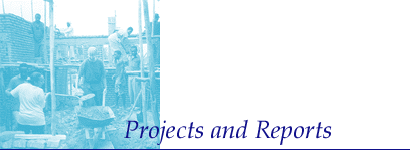

May 13, 2001 Update
At the beginning of April the AVP-Rwanda Team returned after a very successful twelve AVP workshops in Rwanda. David Bucura of Rwanda Yearly Meeting did an excellent job of organizing the workshops in various parts of the country, including food, lodging where necessary,and transportation of both facilitators and participants. All workshops were full and people anxious to be chosen to go onto the next level of training. The American and Ugandan facilitators worked well together. Twelve Rwandans apprenticed their first facilitation of the workshops. A group of eight Rwandans from around the country formed the beginnings of an AVP organization to decide the next directions for AVP in Rwanda. The Team more than accomplished the goals we had set for the program. The few drawbacks included (a) few women participants (which the Rwandans were well aware of), (b) the failure of the two people designated from Congo Yearly Meeting to attend, although another Congolese from Goma did attend, and (c) the large majority of participants who were Protestants, thereby little involvement from Catholics, Moslems, or the secular community.
The Burundi Team also completed its training in South Africa at the end of March. As I reviewed their evaluations of the training, I was struck by how much they needed to learn and the magnitude of the task that we have given them in founding the Burundi Trauma Healing and Reconciliation Center. Since they returned to Burundi, they have each planned a half-day workshop in trauma healing. They then travelled to Kibimba and held these four workshops. They were enthusiastically received. For example, at the first workshop for pastors from the Quarterly Meeting and staff of Kibimba hospital, the participants did not want their break, did not want to stop for lunch, and wanted to continue in the afternoon (when the Team was scheduled to conduct a second workshop for older students from Kibimba secondary school). While the participants had frequently seen the signs of trauma, they did not understand that these signs were indications of traumatic experiences. After the Team processes their experiences in these workshops, they willcontinue to facilitate more.
I will be travelling from May 28 through June 4 to Burundi to meet with the Team.
Consequently in my next report I will have first-hand observations to give you.One of the goals of AGLI is to stimulate interest and interaction between us and those in the Great Lakes. Bill McMechan from Canada called me to tell me that two years after he returned from the initial AGLI delegation, he was able to receive considerable funding for AVP-Uganda (sufficient perhaps for about an additional 100 AVP workshops over the next eighteen months) through the Canadian Friends Service Committee and will be visiting Uganda again in the near future. The funds came from a grant submitted to the Canadian government. I also helped Heidi Witmer, a junior at Haverford College, to spend the summer with Bridget Butt and the Quakers in Kigali, Rwanda, working with the Peace Center they have started there and with the Rwanda Reconciliation Commission (a government sponsored program). This is sponsored by a new peace studies program at Haverford College.
From May 10 to 13, AGLI Working Group members, together with some FPT coordinating committee members, AGLI Consultative Group members, and returned Team members, met at QUNO and Monclair Meeting (Carolyn Keys's home meeting) for two plus days of discussion, brainstorming, and planning for the future. This was the first time the AGLI Working Group has met face to face.
Peace,
About AGLI | Peace Team Opportunities | Contact us | What's Related | Home Page